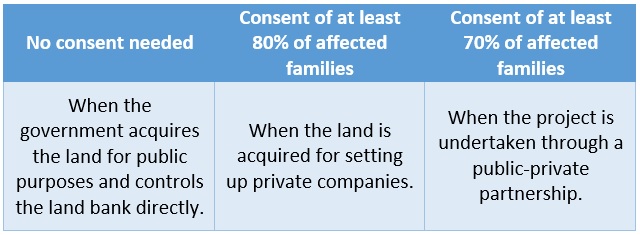[Tmdl.edu.vn] We examine the main provisions of the Land Acquisition Act, 2013 in India, the purposes for which it can be used and how it affects land owners
The Right to Fair Compensation and Transparency in Land Acquisition, Rehabilitation and Resettlement Act, 2013 has replaced the archaic Land Acquisition Act, 1894, to bring in a new procedure, aimed at granting fair compensation to those affected.
[Tmdl.edu.vn] How to calculate land value?
var adpushup = window.adpushup = window.adpushup || {};
adpushup.que = adpushup.que || [];
adpushup.que.push(function() {
adpushup.triggerAd(“4cbc6643-b533-4344-bc4b-1c337dc43234”);
});
What is land acquisition?
Land acquisition is a process by which the government (state or union) can acquire private land for various purposes. In return, the government pays a suitable compensation to the land owner and would be responsible for the rehabilitation and resettlement of the affected land owners.
What is Land Acquisition Act 2013?
The Land Acquisition Act, 2013, regulates and governs the entire process of land acquisition. The Act chalks out the provision for providing fair remuneration to the land owners.
[Tmdl.edu.vn] How to arrive at the fair market value of a property, and its importance in income tax laws
Land Acquisition Act: Objective
- To ensure a transparent process for acquiring land, in consultation with all the stakeholders and local governing bodies.
- To ensure minimum displacement of the existing population, owning or staying on the land.
- To provide fair compensation to the families who are affected or whose land has been acquired or livelihood has been affected, because of the land acquisition.
- To provide adequate provision for rehabilitation and resettlement of the families affected.
[Tmdl.edu.vn] SEZ full form, benefits, features of Special Economic Zone in India
Purpose of land acquisition act
The government can procure land for its own use or for public sector companies or for ‘public purpose’, which can include any of these:
- For any work related to state or national security or defence services of India, which includes naval, military, air force or other armed forces, under the purview of the state or central government.
- For building public infrastructure but excluding private hospitals, private educational institutional and private hotels.
- For any project involving agriculture or allied industries, such as dairy, fisheries or meat processing, owned by the government or by farmer’s cooperatives.
- For industrial corridors, manufacturing zones or other projects listed in the National Manufacturing Policy. This can also include mining activities.
- For water harvesting, conservation structure projects or for planned development or improvement of village sites.
- For government-aided educational and research institutions.
- For planned development, such as creating housing projects for the weaker sections, in rural or urban areas.
- For developing residential projects for the poor or landless, or for people affected by natural calamities.
[Tmdl.edu.vn] The pros and cons of investing in farmland
Importance of consent under Land Acquisition Act

When the government acquires land for public purposes and controls the land bank directly, the land owners’ consent is not a necessity. However, when the land is acquired for setting up private companies, the consent of at least 80% of the affected families is mandatory. If the project is undertaken through a public-private partnership, then, 70% of the affected families have to give their consent for the land acquisition process.
Also read: What is freehold land
Compensation under Land Acquisition Act
Section 26 of the Act that deals with compensation for the land owners. It outlines the proposed minimum compensation, based on multiples of the market value. Usually, the market value is multiplied by a factor of one of two times, for land acquired in rural and urban areas.
The market value of the land is determined by the average sale price for similar types of land situated in the nearest village or nearest vicinity area. This sale price is assessed, by considering one-half of the total number of sale deeds or the agreements to sell, in which the highest price has been mentioned.
The compensation can also be a consented amount, in case the land is acquired for private companies or public-private partnership projects.
[Tmdl.edu.vn] What is undivided share of land
Problems with Land Acquisition Act
The land Acquisition Act, 2013, was amended in 2015 which resulted in the following shortcomings:
- The Social Impact Assessment was a must for every acquisition in the Act but the mandatory requirement was removed for security, defence, rural infrastructure and industrial corridor projects in the amendment.
- Consent is not mandatory for government projects in the latest amendment. This can result in forceful evictions of land owners, without proper alternate arrangements for their rehabilitation and resettlement.
- Earlier, multi-cropped land could not be acquired for any purpose but according to the latest amendment, even multi-crop irrigated land can be acquired for security and social infrastructure projects.
[Tmdl.edu.vn] All about conversion of agricultural land to non agricultural land
Land Acquisition Act timeline
September 7, 2011: Land Acquisition, Rehabilitation and Resettlement Bill, 2011, introduced in the Lok Sabha.
August 29, 2013: Bill passed in the Lok Sabha.
September 4, 2013: Bill passed in the Rajya Sabha.
September 27, 2013: Bill receives the president’s approval.
January 1, 2014: Land Acquisition Act comes into force.
May 30, 2015: President promulgates the amendment.
Also read all about pros and cons of investment in land
FAQs
Is Land Acquisition Act 1894 repealed?
In 2013, the Land Acquisition Act, 1894 was replaced with the Right to Fair Compensation and Transparency in Land Acquisition, Rehabilitation and Resettlement Act.
What is the new Land Acquisition Act?
The Land Acquisition, Rehabilitation and Resettlement (LARR) Bill, 2011, is a law that lays down various provisions and directions to be followed, while acquiring land anywhere in the country.
Can the government take your land in India?
Yes, the government can take your land for building infrastructure or economic zones.
{
“@context”: “https://schema.org”,
“@type”: “FAQPage”,
“mainEntity”: [
{
“@type”: “Question”,
“name”: “Is Land Acquisition Act 1894 repealed?”,
“acceptedAnswer”: {
“@type”: “Answer”,
“text”: “In 2013, the Land Acquisition Act, 1894 was replaced with the Right to Fair Compensation and Transparency in Land Acquisition, Rehabilitation and Resettlement Act.”
}
}
, {
“@type”: “Question”,
“name”: “What is the new Land Acquisition Act?”,
“acceptedAnswer”: {
“@type”: “Answer”,
“text”: “The Land Acquisition, Rehabilitation and Resettlement (LARR) Bill, 2011, is a law that lays down various provisions and directions to be followed, while acquiring land anywhere in the country.”
}
}
, {
“@type”: “Question”,
“name”: “Can the government take your land in India?”,
“acceptedAnswer”: {
“@type”: “Answer”,
“text”: “Yes, the government can take your land for building infrastructure or economic zones.”
}
}
]
}
Source: https://tmdl.edu.vn/us
Copyright belongs to: Tmdl.edu.vn





